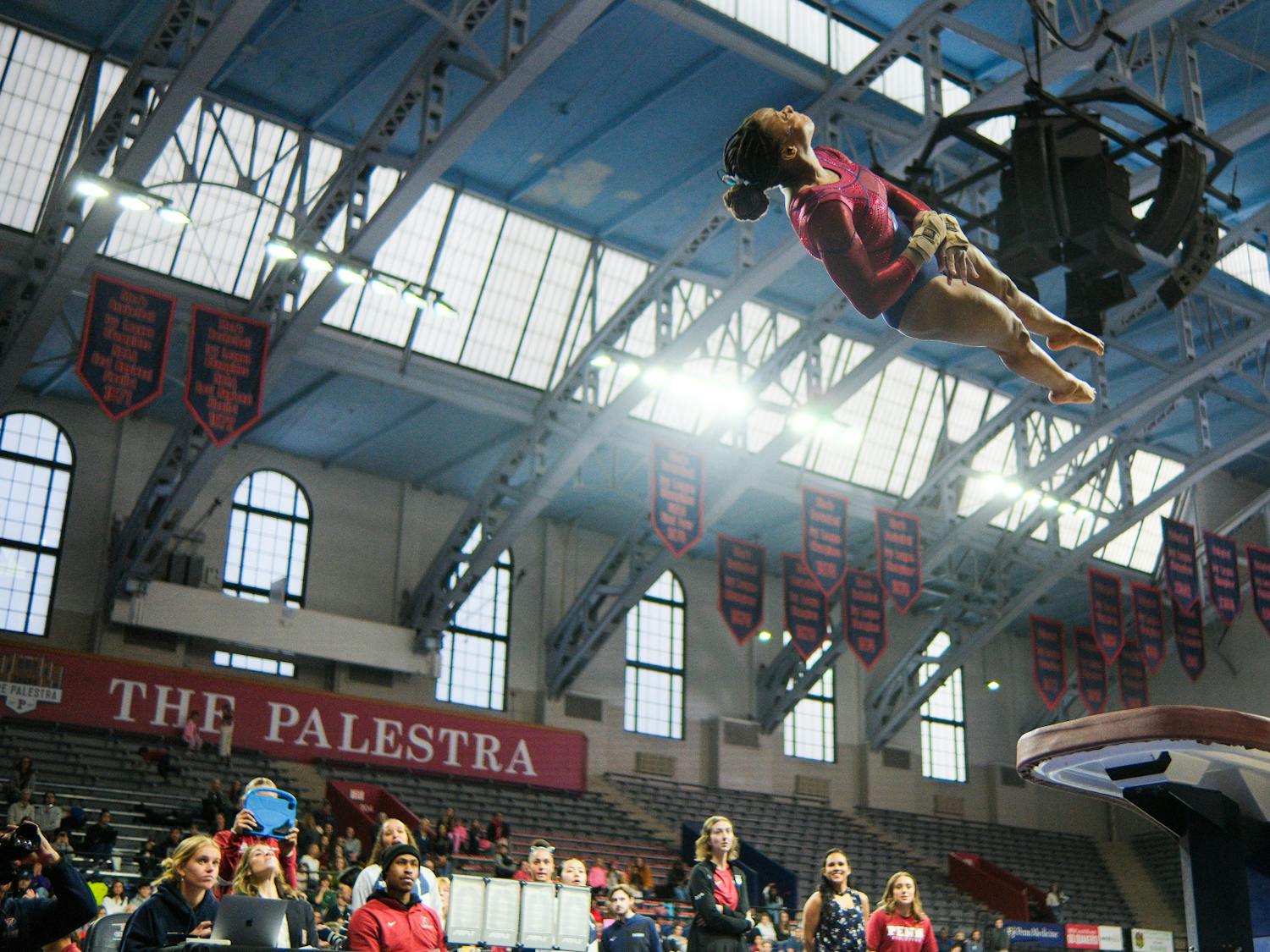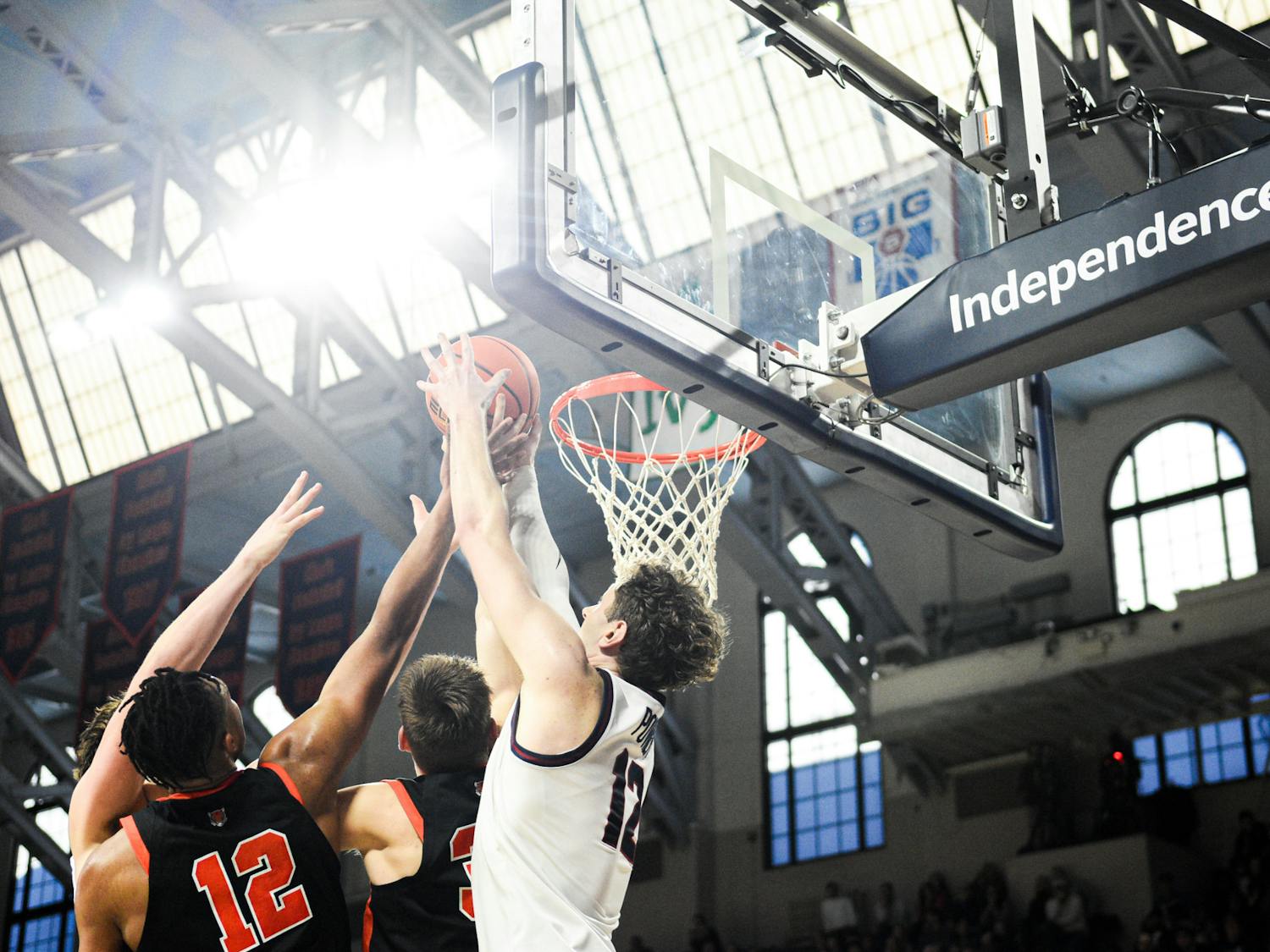On a hot, muggy day in the summer of 1951, Ernie Beck stepped up to the foul line. Although the Palestra was empty, it sweltered in the usual mid-day heat. It was his lunch break and during the one hour he had off, he spent it at the place that had been his home over the previous two years.
This was routine during the summers he spent working for Penn Athletics. Beck practiced in his home — the place where he became the all-time leading scorer in Penn history.
“I had some of my greatest games at the Palestra,” Beck said. “The campus is so much different today than from when I went to Penn. Everything’s different. It’s so much bigger and big-time today, but the Palestra is still the same.”
- * *
Beck’s roots in the game began much before he would become a Penn basketball legend, correspond with Wilt Chamberlain and coach high-school basketball.
He first began to hone his skills as a child in the late 1930s with pick up games at a neighborhood school yard near his house on Upland Street in southwest Philadelphia.
“We’d go around and play at different basketball courts where you knew that the weekend, there were going to be a lot of players there to play,” Beck said. “There was a lot of good basketball in the city.”
After he entered middle school, he joined a Catholic youth organization of Most Blessed Sacrament Parish, his first experience playing organized ball. His team achieved early success, even winning a national championship. By the time Beck entered high school at West Catholic — now West Philadelphia High School — he was already seasoned.
During his three years on the West Catholic varsity squad, he moved his way up the ranks. By the time he was a junior, he was a starter, and during his senior year, he led the league in scoring and took his team to a trifecta of post-season tournaments.
That year, in 1949, Beck and West Catholic won the Philadelphia Catholic League championship and also took down Overbrook High School to win the Philadelphia City Championship. They even won the Eastern State Championships.
With his phenomal play, Beck was getting noticed.
He was offered scholarships to Notre Dame and local universities, including St. Joseph’s, Villanova and La Salle. He also received offers from Columbia and Penn.
Former West Catholic alumnus and Quakers’ basketball player Richard Dougherty ultimately pointed Beck towards Penn.
“And after meeting the coach,” Beck said of former Penn player and then-Penn coach Howie Dallmar, “I decided my grades were good and I took a scholarship to the University of Pennsylvania.”
- * *
When Beck matriculated to the Wharton School in the fall of 1949, tuition was $700 and Penn football packed Franklin Field.
As part of Beck’s “grant and aid,” he lived in Newman Hall on the corner of 38th and Spruce along with many of the Catholic athletes.
As rookies could not play varsity basketball at the time, he joined the freshman team.
Outside of basketball, Beck was very involved with his fraternity, the Newman center, school and other work he had to do.
“I always had a job,” Beck said. “I worked as an usher at the basketball games in my freshman year because I couldn’t play varsity. Being a member of the basketball team, I did go to a lot of fraternity parties in the school year … I did pretty well [socially].
“But during basketball season I was busy all the time between my books and playing ball.”
Beck was mostly busy with his major goal each year: to win the Ivy League.
Only after three years on varsity did he accomplish this feat. The win, in Beck’s senior year in 1953, secured Penn’s first-ever bid to the NCAA Tournament, where they ultimately lost to Notre Dame in the first round.
“It was a different atmosphere completely then,” Beck said. “There was no Big 5. I would say our attendance average was 6,000-7,000 a game.”
In only three years, Beck set the standard for Penn basketball for decades to come.
He still remains the highest career scorer of all time — with 1,827 points — and in a single game — 47 against Duke — to name a few of his many accolades.
- * *
After graduation, Beck eventually made his way to the then eight-team NBA.
A first round draft pick, he was offered an $8,500 salary — a contract negotiated with the infamous basketball executive Eddie Gotlieb — to begin his NBA career.
In just his first year on the Philadelphia Warriors in the 1955-56 season, he and his team won the NBA title over the Fort Wayne Pistons.
Beck played with the Warriors during transition years for the NBA, as television broadcasts were slowly becoming more popular. By the time he retired, the league showed early signs of what it is today.
“When I was with the Warriors, my last year, Wilt Chamberlain came up … he was the first real superstar.”
As TV began covering pro ball, the salaries began to rise. When Beck started, agents or trainers simply did not exist. Teams traveled with just the 10 players and the coach.
“It was so different than it is today,” Beck said. “Everything is big business today. On the road, we would have to pay for our own cabs from the airport and we would only have one uniform when we were traveling.”
Beck played with the Warriors through 1960. After retiring from the team, he played semi-professional basketball before moving into teaching and coaching.
After initially working for an insurance agency, Beck decided to change directions.
In 1962, he started teaching economics at Bok Technical High School, adding coaching to his resume two years later. He coached for 29 years until 1993, when he retired from teaching.
- * *
Now that Beck is fully retired, he says he just enjoys life. He is still active with his parish in Havertown, P.A., and also works with the Catholic war veterans.
“I just have a happy life,” he said.
Every once in a while, Beck still makes his way back to the Cathedral of Basketball. Though new scoreboards and seating have brought the Palestra into the 21st century, there are parts of the historic arena that haven’t changed from Beck’s time winning championships.
“The floor looks the same and the baskets look the same. I go around the Palestra and I look at all the pictures and all the names of all these players that were there at one time or another,” Beck said. “It has tremendous memories for me.”








